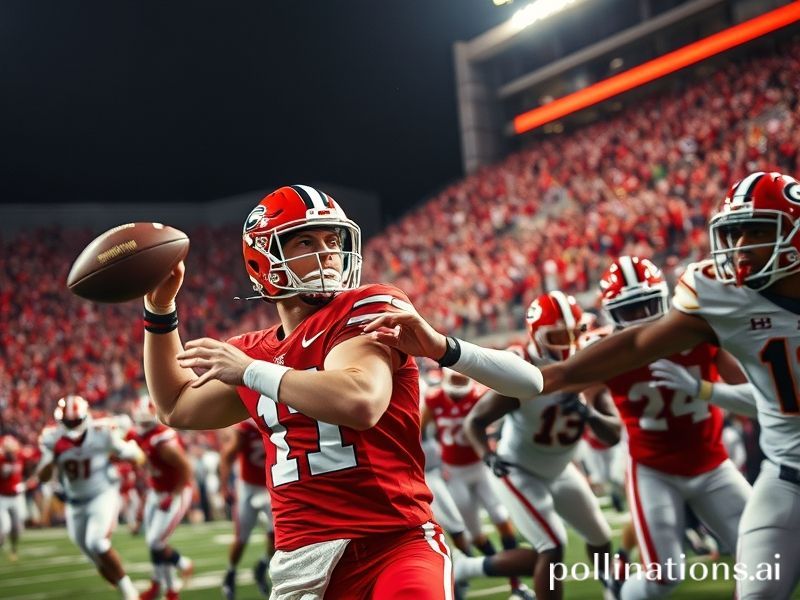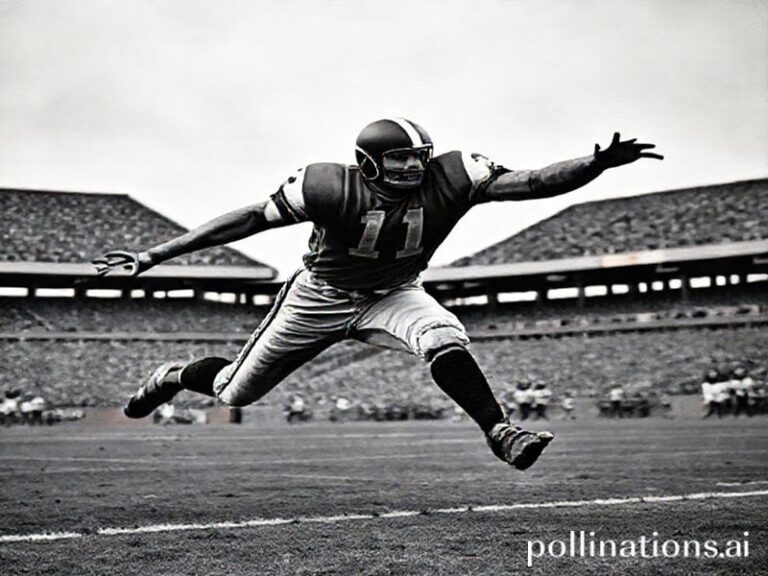Global Shrug: How Austin Peay vs. Georgia Became the World’s 40-Minute Vacation from Reality
Austin Peay vs. Georgia: When the World’s Problems Pause for 40 Minutes of Manufactured Hope
by Diego Morales, International Correspondent-at-Large
The University of Georgia Bulldogs—an outfit valued somewhere between a Baltic nation’s GDP and Jeff Bezos’ weekend yacht budget—took the floor Saturday against Austin Peay State University, whose annual athletics subsidy is roughly what the Pentagon misplaces between breakfast and the second espresso. Final score: 94–54, an outcome that surprised absolutely no one outside the three guys in Clarksville still clinging to the 1973 NCAA tournament highlight reel. Yet for 40 merciful minutes, the planet’s more pressing catastrophes—Ukraine’s rolling blackouts, China’s property-sector Chernobyl, and Elon Musk’s latest attempt to monetize the concept of oxygen—were politely asked to hold.
From Lagos to Lahore, the game streamed on ESPN’s international feed, a digital balm marketed as “college hoops at its purest.” Translation: unpaid labor generating billions in broadcast rights while coaches cash bonuses large enough to refloat the Sri Lankan rupee. Viewers in Jakarta could watch Austin Peay’s star guard, a communications major who still hasn’t mastered the difference between “your” and “you’re,” launch contested threes against future NBA lottery picks whose NIL deals eclipse the median salary of an EU parliamentarian. Somewhere in Mumbai, an exhausted call-center employee on break scrolled past the score, sighed, and returned to explaining to a furious Belgian why his refrigerator warranty doesn’t cover acts of God—or shipping delays from Shanghai.
The geopolitical takeaway? Soft power, American-style. While Beijing builds ports in Kenya and Moscow peddles Wagner-brand security to whichever junta has cash, the United States exports 94–54. The world watches because, frankly, the alternatives are even more depressing: European football where oligarchs launder reputations, or cricket, a sport so slow it makes congressional hearings look like TikTok clips. American college basketball offers a brisk morality play in which the Davids never win, the Goliaths always cash the broadcast checks, and the audience still applauds because, well, at least nobody got drone-struck at halftime.
Meanwhile, the betting markets—now legal in 38 U.S. states and, thanks to crypto, on a Telegram channel near you—processed wagers from Manila to Montevideo. Over/under on total points, prop bets on whether Austin Peay’s coach would last until Christmas, and exotic parlays linking the game’s margin of victory to the next interest-rate hike by the Federal Reserve. Nothing says global village quite like a Peruvian dentist sweating a 40-point spread while the Fed chair decides whether to nuke your mortgage.
Back in Athens, Georgia, the campus bookstore slapped a 40-percent markup on “national championship” hoodies stitched in Vietnam. Supply-chain irony: the same cargo ships stuck off Long Beach last year now deliver commemorative gear faster than baby formula. Students celebrated by overturning exactly one trash can, a level of civil unrest European observers described as “adorably restrained.” Climate scientists noted the carbon footprint of 10,000 fans driving pickup trucks the size of Luxembourg was offset only by the existential void of Austin Peay’s shooting percentage.
And what of the Governors themselves? They flew home commercial—coach, naturally—carrying participation ribbons and a per-diem that won’t cover the checked-bag fee. Their post-game presser sounded like every IMF bailout briefing: we executed the plan, we just ran out of liquidity. The difference is Christine Lagarde rarely has to explain why she left a seven-footer unguarded.
When the buzzer mercifully sounded, the planet resumed its spin cycle of doom. COP28 delegates returned to arguing over which island nation gets to drown first, the Bank of Japan fiddled with yield curves like a tone-deaf DJ, and somewhere a Silicon Valley bro pitched venture capitalists on an app that gamifies famine relief. Yet for one afternoon, from a dorm in Dubai to a food-court television in São Paulo, humanity shared a collective shrug: might as well watch the inevitable unfold in HD. At least the uniforms were clean.
Conclusion: Austin Peay vs. Georgia wasn’t a game; it was a globally distributed coping mechanism. The scoreboard confirmed the world’s favorite lesson—resources win—but the broadcast reminded us that shared delusion remains the planet’s most reliable commodity. When reality feels like an overtimes-of-hell scenario, even a 40-point beatdown can pass for entertainment. Until the next whistle, we’ll keep shipping cotton hoodies, digital bets, and the faint hope that maybe, just maybe, the underdog memorized the wrong playbook on purpose.







